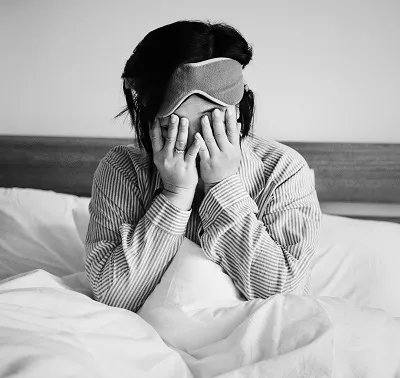According to the National Sleep Foundation, insomnia is referred to as a chronic sleep disorder. This disorder is accompanied by inadequate sleep and other sleep problems that appear despite the sufferer having ample time and opportunity to sleep.
People who are experiencing insomnia are aware of the severe challenges they face. This is because due to lack of sleep everything in life gets affected. Therefore, insomnia, once it reaches a certain point, can be considered a disability. However, the Social Security Administration (SSA) has not mentioned insomnia in its blue book with the list of disabilities.
Insomnia may be accompanied by other disabilities such as narcolepsy, sleep apnea, restless leg syndrome, and many other conditions. Therefore, a patient can apply for the social security disability benefits based on their symptoms or based on one of the accompanying conditions that is in fact listed in the blue book.
What causes Insomnia?
Before applying for Social Security insomnia disability benefits, it is important to understand the fundamental causes of insomnia. Insomnia can be caused by a variety of disorders such as depression, dementia, Post-traumatic stress syndrome (PTSD), and many other conditions as well.

Your doctor’s advice and counsel may also give you clarity on whether you can apply for the disability benefits or not. It is widely known that insomnia can adversely affect many aspects of your life. Once the cause of your insomnia is identified, however, you may be able to treat your symptoms with proper medication, changes made in your lifestyle, or some other recommendation from your treating medical professional.
Types of Insomnia
Generally, there are two types of insomnia:
- Acute Insomnia: This type of insomnia will last only for a short time, generally 30 days or less.
- Chronic Insomnia: This type of insomnia is more complicated than acute insomnia. There are frequent episodes in a week and it often lasts for 30 days or more.
Effects of Insomnia
As previously stated, if you are suffering from insomnia that has been lasting for more than 30 days, it is termed chronic insomnia. People suffer from chronic insomnia due to stress, excessive use of drugs, hormonal imbalance, and chronic pain, among a host of other causes.
Some of the most common impacts of insomnia are discussed as follows:
- Blurred vision
- Double vision
- Muscle fatigue
- Mental health issues
- Hallucinations
- Problems in focusing
- Anxiety
- Headaches
- Irritation
- Problems in digestion
- Organic mental disorders
- Feeling of living in slow motion
Some of the treatments for insomnia and its symptoms may include psychotherapy or medication. Chronic insomnia left untreated can lead to a host of mental disorders such as OCD, clinical depression, and bipolar disorder.
Can you get a disability for insomnia?
As we have already mentioned, chronic insomnia has not been listed in its blue book by the SSA. Therefore, it is important to know how you can apply for the disability despite its absence in the blue book. To qualify, an insomnia sufferer needs to meet any of the following eligibility criteria:
Firstly, you must know which condition has caused insomnia. This is because it may be the case that the underlying condition is listed in the blue book. If it is, you can apply for the disability claim on the basis of the underlying condition. These conditions could include heart disease, mental disorder, or digestive issues
OR
Your residual functional capacity meaning your capability to work or to gain any substantial gainful activity has been preventing you from any work.
How to get a VA disability for Insomnia?
To apply for the Insomnia VA disability, it is essential to find out the primary cause of the disorder. It may be unclear as to what has caused insomnia, yet there are some common causes. These may include psychiatric illnesses and chronic stress may cause secondary insomnia and can bring a significant amount of change in your life.
The veterans who are experiencing any of the above-mentioned symptoms may wonder if their military service is the reason for their insomnia. If the veteran can demonstrate that their disability is caused by a condition of their service, they can apply for the disability benefits.
To show the service connection for insomnia, an applicant must provide some evidentiary information. They must have a proper diagnosis of the ongoing medical treatment. Further, they must describe how their service led to insomnia. An official letter by your healthcare provider stating that your disability was caused by your service should suffice.
Compensation and Pension (C&P) Examination for Insomnia
Some of the most common reasons that Veterans claim cause insomnia include: if the veteran lost a fellow member tragically or if the Veteran has faced some sudden attack on a mission. These traumatic events can lead to psychological stress that causes insomnia. However, an in-service connection does not necessarily mean that you incurred a disability while on active duty. Depending on the circumstances, veterans may be eligible for an alternative compensation and pension examination, also known as a C&P exam.
The C&P exam is beneficial for the veterans as the exam can diagnose their disability and allows for a second opinion about their illness. The exam may also consist of some psychological testing. The in-charge healthcare professional will ask some questions related to your disability. This will help to better diagnose the disease and will give clarity on how it has impacted your health and mental condition.
In some circumstances, if the veteran has developed insomnia due to different reasons which are also connected to service, the claim may fall under secondary insomnia. The applicant can then apply for the VA disability claim for suffering from secondary insomnia.
If a veteran has been suffering from the disorder before the military service, they may still be able to obtain the benefits through service connection by aggravation. In this case, the disability will be rated differently based on mental or physical disability.